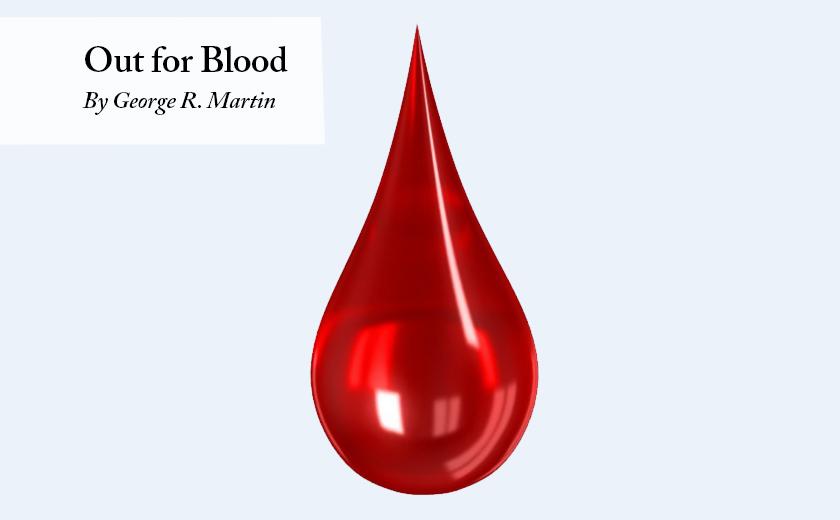I’m out for blood.
The present treatment for my disease involves periodic blood transfusions. The regimen is simple and painless, involving primarily waiting for the transmission of blood to be complete. It takes a few hours.
Waiting is an experience in itself: there’s a quality to waiting, any kind of waiting. Each occasion has a tone and timbre and especially the velocity at which the time seems to travel. Sometimes time feels interminably stuck. These waits, whether in hospitals or physicians’ offices, or even waiting in a garage while having my ailing car serviced, can be lonely. Waiting has the potential to be a harbinger of unwanted news. A wait will surprise me at times; some become an adventure in awareness.
I received a blood transfusion just a week ago at the Infusion Center at the hospital in Easton. As I sat in the chair my eyes wandered aimlessly around the room and then upward where I saw the small clear plastic bag hanging. It looked like the ones I remember as a boy in which I’d bring my goldfish home from the pet store. Strange to think now how both these totally unrelated events, seventy years apart, made an statement about the reverence for life.
The bag hung just above me containing what looked like watered down cocktail sauce. I watched the bag as blood, drop by drop, worked its way down through a plastic line and into my veins. I thought to myself, this is an amazing thing: someone, somewhere, a person I’d never met and whom I never will, took time to have their blood drawn at a blood bank so that someone else who one day would require it, could receive it and live. Something about the thought was benignly provocative: it seemed so anonymous and yet so personal and intimate, deeply loving but also earthy, too, as if there is nothing more primal about life than blood. Because of the location where blood transfers take place, in clinical settings which are usually spare and antiseptic, the deeper significance implied in these acts may easily be lost.
Freud once quipped that a cigar is just a cigar. Blood transfusions are just blood transfusions, routine and perfunctory, performed in hospitals everywhere. But in that moment, as I waited and as my mind wandered and I watched the blood which had once flowed through someone else’s body, it become a part or my own body. I knew I was experiencing more than just a transfusion. My awareness of the procedure that moment assumed what I can only describe as mystical awareness, one of those peculiarly transcendental moments I have that just suddenly appear and the total of what goes on at those moments is always more than the sum of the parts.
I marvel when I consider how the blood that runs through the veins of every living being, becomes an equalizer of sorts, establishing our primal solidarity with one another. Without exception, we all have this in common and in the most fundamental way our lives are interconnected by a shared blood. St. Paul put it this way: God “hath made of one blood all nations of men (people) for to dwell on all the face of the earth.”
Blood types vary. Their essence remains the same. Blood is the quintessential sustainer and the universal symbol of our organic connection to one another. The sad story of our humanity has been how much of our energy has been wasted developing ways of shedding blood rather than ways of sharing it. I think this happens because while we may have vague notions about this organic bond we share, we have little if any concept of the spiritual fabric into which we’re woven together.
On several occasions, I’ve read accounts of people who, having received organ transplants, will claim to feel deep within them the spiritual presence of the donor whose organ was now incorporated into their own body. The sense of gratitude such people express, often with tears, is obviously profoundly felt.
The transfusion was completed, and the nurse and I bantered some as she disconnected the tubing, took vitals, and sent me on my way.
On my way out, at the door I thought someone was coming up behind me, so I turned to make sure I held the door for them. There was no one there. I knew I was not alone. Someone was there. I felt it. This was not an extrinsic presence out there somewhere; by their blood someone became integral to my whole being. In short, an anonymous gift of love wrapped in a plastic bag saved my life. One irony: the anonymous donor who’d given me the gift was leaving the hospital with me, perhaps to keep me aware that I now had a special blood brother or sister.
So that no one could see my face and I’d embarrass myself, while walking out and down the hall I turned my head downward slightly and murmured, ‘Thank you.’
N.B. Because of pandemic, Blood Banks both nationally and locally are experiencing fewer donors and in some areas critical shortages. Please help. For donation sites contact: delmarvablood.org or call 1-888-blood8.
Columnist George Merrill is an Episcopal Church priest and pastoral psychotherapist. A writer and photographer, he’s authored two books on spirituality: Reflections: Psychological and Spiritual Images of the Heart and The Bay of the Mother of God: A Yankee Discovers the Chesapeake Bay. He is a native New Yorker, previously directing counseling services in Hartford, Connecticut, and in Baltimore. George’s essays, some award winning, have appeared in regional magazines and are broadcast twice monthly on Delmarva Public Radio.


 ”
”